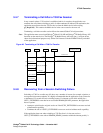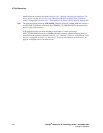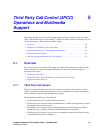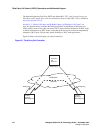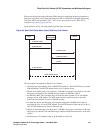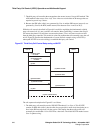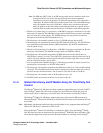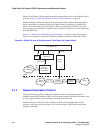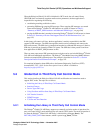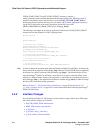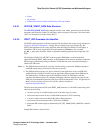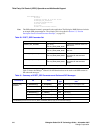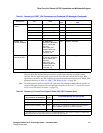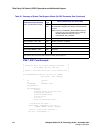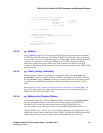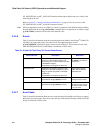Dialogic
®
Global Call IP Technology Guide — November 2007 343
Dialogic Corporation
Third Party Call Control (3PCC) Operations and Multimedia Support
When the Dialogic
®
Global Call API is initialized in 3PCC mode, the call control library
(IPCCLIB) does not internally negotiate media session parameters; the host application is
responsible for negotiating the following:
• coordinating matching audio/video coders
• generating SDP data for outgoing SIP messages. These outgoing SIP messages are created
when certain Dialogic
®
Global Call API functions are called (as shown in Table 21,
“Summary of IPSET_SDP Parameters and Outbound SIP Messages”, on page 346)
• parsing the SDP data that is attached to incoming Dialogic
®
Global Call API events (as shown
in Table 22, “Summary of Events That Support Global Call SDP Parameter Sets”, on
page 347)
In third party call control call flows, the host application is entirely responsible for the SDP
contents of SIP messages. The SDP data negotiates media session parameters and connects the
RTP media streams. The SDP data is generated and attached to outbound SIP messages. Likewise,
SDP data is parsed from incoming Global Call events. The SDP data is then passed to and from
host applications in IPSET_SDP parameter set IDs.
There are many open source SDP generator/parser tools that can be used to build Dialogic
®
Global
Call API-based multimedia applications. The Dialogic
®
Host Media Processing (HMP) Software
includes an example SDP generator/parser. The example is described in Section 5.3, “Session
Description Protocol Parser/Generator Example”, on page 353.
For complete information about SDP, refer to the Internet Engineering Task Force (IETF)
document RFC 2327 - SDP: Session Description Protocol, which is available at
http://ietf.org/rfc/rfc2327.txt.
5.2 Global Call in Third Party Call Control Mode
This section describes the Dialogic
®
Global Call API modifications and extensions made to
support 3PCC mode. The topics are as follows:
• Initializing the Library in Third Party Call Control Mode
• Interface Changes
• Device Types and Usage
• Using Fast Start and Slow Start Setup in Third Party Call Control Mode
• Call Transfer Scenarios
• DTMF Transport
• T.38 Fax and Tone Detection
5.2.1 Initializing the Library in Third Party Call Control Mode
The Dialogic
®
Global Call API library supports two mutually exclusive modes of operation, first
party call control (1PCC) mode and third party call control (3PCC) mode. The mode of operation is
set when the Dialogic
®
Global Call API library is initialized by calling gc_Start( ). The
IPCCLIB_START_DATA data structure, which is passed to gc_Start( ) via the



